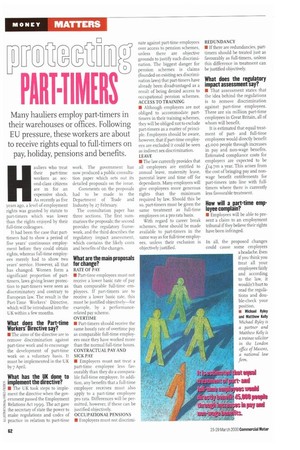Many hauliers employ part-timers in their warehouses or offices. Following
Page 64

If you've noticed an error in this article please click here to report it so we can fix it.
EU pressure, these workers are about to receive rights equal to full-timers on pay, holiday, pensions and benefits.
Hauliers who treat
their part-time workers as second-class citizens are in for an expensive shock. As recently as five years ago, a level of employment rights was granted by statute to part-timers which was lower than the rights enjoyed by their full-time colleagues.
It had been the case that parttimers had to show a period of five years' continuous employment before they could obtain rights, whereas full-time employees merely had to show two years service. However, all that has changed. Women form a significant proportion of parttimers, laws giving lesser protection to part-timers were seen as discriminatory and contrary to European law. The result is the Part-Time Workers' Directive, which will be introduced into the UK within a few months.
What does the Part-time Workers' Directive say?
• The aims of the directive are to remove discrimination against part-time work and to encourage the development of part-time work on a voluntary basis. It must be implemented in the UK by 7 April.
What has the UK done to EE, implement the directive? it I The UK took steps to =pie@ meni the directive when the gov.
▪ ernment passed the Employment g Relations Act 1999. The act gave
the secretary of state the power to t4m make regulations and codes of
practice in relation to part-time work. The government has now produced a public consultation paper which sets out its detailed proposals on the issue.
Comments on the proposals had to be made to the Department of Trade and Industry by 27 February.
The consultation paper has three sections. The first summarises the proposals; the second provides the regulatory framework, and the third describes the regulatory impact assessment, which contains the likely costs and benefits of the changes.
What are the main proposals for change?
RATE OF PA) • Part-time employees must not receive a lower basic rate of pay than comparable full-time employees. If part-timers are to receive a lower basic rate, this must be justified objectively—for example, by a performancerelated pay scheme.
OVERTIME • Part-timers should receive the same hourly rate of overtime pay as comparable full-time employees once they have worked more than the normal full-time hours. CONTRACTUAL PAY AND SICK PAY • Employers must not treat a part-time employee less favourably than they do a comparable full-time employee. In addition, any benefits that a full-time employee receives must also apply to a part-time employee pro rata. Differences will be permitted, however, if these can be justified objectively.
OCCUPATIONAL PENSIONS • Employers must not discrimi nate against part-lime employees over access to pension schemes, unless there are objective grounds to justify such discrimination. The biggest danger for pension schemes is claims (founded on existing sex discrimination laws) that part-timers have already been disadvantaged as a result of being denied access to occupational pension schemes. ACCESS TO TRAINING • Although employers are not obliged to accommodate parttimers in their training schemes, they will be obliged not to exclude part-timers as a matter of principle. Employers should be aware, however, that if part-time employees are excluded it could be seen as indirect sex discrimination. LEAVE • The law currently provides that all employees are entitled to annual leave, maternity leave, parental leave and time off for dependants. Many employers will give employees more generous rights than the minimum required by law. Should this be so, part-timers must be given the same treatment as full-time employees on a pro rata basis.
With regard to career break schemes, these should be made available to part-timers in the same way as for full-time employees, unless their exclusion is objectively justified. REDUNDANCY • If there are redundancies, parttimers should be treated just as favourably as full-timers, unless this difference in treatment can be justified objectively.
What does the regulatory impact assessment say?
• That assessment states that the idea behind the regulations is to remove discrimination against part-time employees. There are six million part-time employees in Great Britain, all of whom will benefit.
It is estimated that equal treatment of partand full-time employees would directly benefit 45,000 people through increases in pay and non-wage benefits. Estimated compliance costs for employers are expected to be /14.7m a year. This arises from the cost of bringing pay and nonwage benefit entitlements for part-timers into line with fulltimers where there is currently less favourable treatment.
How will a part-time employee complain?
• Employees will be able to present a claim to an employment tribunal if they believe their rights have been infringed.
In all, the proposed changes could cause some employers a headache. Even if you think you treat all your employees fairly and according to the law, it wouldn't hurt to read the regulations and double-check your mpositmiilne. Ryiey and Matthew Kelly Michael Ryley is a partner and Matthew Kelly is a trainee solicitor in the London office of Masons, a national law firm.




























































































































